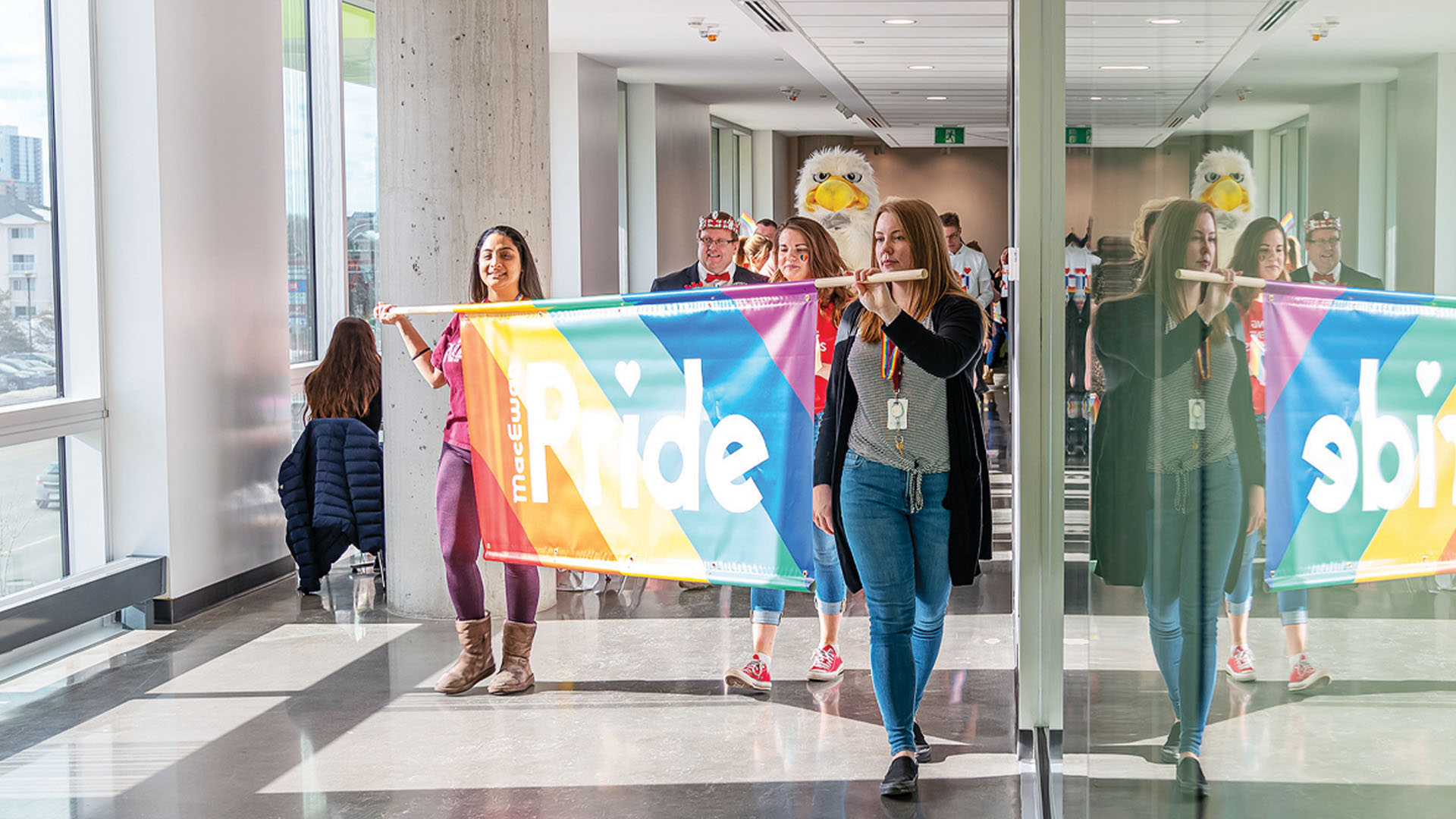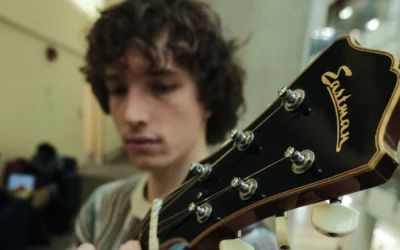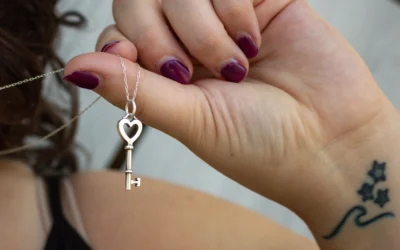Edmonton has a rich tapestry of queer history. As we celebrate Pride Week at MacEwan University this month, it’s also important to reflect on queer history, both in our city and at MacEwan.
“Too often, queer history has been written out of our textbooks,” says Dr. Kristopher Wells, the executive director of the Centre for Sexual and Gender Diversity at MacEwan and the Canada research chair for the public understanding of sexual and gender minority youth. “It’s been silenced in public discourses.”
Wells adds: “We like to say that queer history is everywhere. You just need to look and know where to look. And that includes here at MacEwan.”
Despite a lot of queer initiatives on campus over the years, Wells notes that not very much of it has been systematically documented.
One of the earliest queer events at MacEwan that Wells is aware of is a series of conferences that were hosted at MacEwan in the ‘90s and early 2000s, called the Diversity Conferences of Alberta Society. “The purpose of those conferences was to bring together discussions of sexuality and spirituality from a variety of faith-based perspectives,” says Wells, who attended the conferences as a graduate student.
The conferences were organized by Reverend Charles Bidwell, Reverend Bert Frey and his wife, Evelyn Frey. The Frey’s advocated for change within the church and also worked to foreground LGBTQ issues and identities, explains Wells.
“Looking back on those programs,” Wells says, “they were very ahead of their times, talking about the need for trans inclusiveness, two-spirit identities, and (running) workshops that were more conscious about amplifying voices from our racialized communities (with a) stronger focus on intersectionality.”
“There’s a lot that we can learn from the past as we’re thinking about the kinds of programming work that is needed today at MacEwan and out in our community,” adds Wells. “I think it’s really important to know the past because so many of those individuals fought for (queer) rights at great risk to themselves…. We get to enjoy (those rights) today on campus.”
Additionally, MacEwan’s student pride alliance group, InQueeries, has been a proud pillar of queer history at MacEwan over the years and has been involved in everything from campus programming and events to pride week initiatives.
“There have been people for decades who have been working in various ways and capacities to support LGBTQ issues and to invite the community into MacEwan to host performances, speaker series, and create safe space initiatives,” says Wells.
Today, MacEwan is working to build a welcoming and inclusive space for everyone. There are courses explicitly focused on LGBTQ topics, such as the course that Wells teaches called “Working with Sexual and Gender Minority and Youth,” and there are courses on gender studies and sexual health.
Wells notes that offering these courses is very important, especially because the current K to 12 curriculum, and proposed versions, exclude LGBTQ identities and history. “It’s really hard as a queer young person growing up to think about your future when you’ve been told that you don’t have a past,” he says, “(when) you don’t see yourself included in your textbooks or in the discussions in your classroom. That can be a very isolating and an alienating experience.”
“We want to really break the silence by making this history visible and accessible to the community and to our students here on campus,” continues Wells.
Another huge part of curating queer inclusivity on campus was through the establishment of the Centre for Sexual and Gender Diversity. Jessica Scalzo, the program coordinator for the Centre for Sexual and Gender Diversity, explains that the Centre serves MacEwan staff and faculty, as well as students.
The main purpose of the Centre is “to create a place for people to gather and also look at changing culture to be more inclusive and more equitable for anyone who’s been pushed toward the margins,” Scalzo says.
The Centre also directly supports the queer community at MacEwan while providing educational opportunities across campus, planning campus-wide events, and fostering research opportunities.
Scalzo says that currently, the Centre is working with the university to incorporate inclusive language in their programming and services, especially in the student registrar and staff registration process. She notes that the current system is very hetero- and cis-normative. The goal is to create a system where students can express their authentic identity without experiencing passive trauma like deadnaming and misgendering.
Additionally, the Centre has strong partnerships with other on-campus bodies, for example, the Mitchell Art Gallery, Wellness and Psychological Services, kihêw waciston, and more. These partnerships help to support equity and diversity across MacEwan as a whole. The Centre also partners with the Rainbow Clinic, which provides inclusive and knowledgeable health care support for LGBTQ students and staff.
“At (MacEwan), we really have this amazing opportunity to help provide the education that’s needed to help lead social change out in our various communities. So we have a tremendous privilege and a responsibility that comes with being Edmonton’s downtown university,” says Wells.
Edmonton’s larger queer history is also inescapably entwined with MacEwan since the university occupies such an important role in Edmonton’s downtown.
CosaFina, located directly across from MacEwan’s University Health Centre, was once the Pisces Health Spa, a bathhouse that was the target of a police raid in 1981. According to a 2021 report by the Edmonton Police Service marking the 40th anniversary of the event, 56 male patrons and six staff members were arrested under the bawdy house law, and the men were subsequently outed in a public news release.
“We believe it is still the largest mass arrest in Alberta’s history that just happened across the street (from MacEwan),” says Wells.
This police raid served as a turning point in Edmonton’s LGBTQ activism. “The community in Edmonton really galvanized and fought back against this police oppression and held fundraisers, raised money to support the defence of the found-ins and really helped to galvanize a new community consciousness,” says Wells.
Wells is the primary investigator for the Edmonton Queer History Project, which documents 27 sites of historical interest to the LGBTQ community in downtown Edmonton, one of which was the Pisces Health Spa. The project represents years of research and has involved community members and researchers alike.
Wells notes that their research has resulted in encyclopedic-like entries for each of the identified historical sites, with extensive archival research and interviews used to construct the entries.
The Edmonton Queer History Project has also created a map with a series of walking tours so people can explore queer history throughout Edmonton. Additionally, they are starting a queer history podcast, “From Here to Queer,” that features Darrin Hagen, a former MacEwan writer in residence.
Edmonton’s Queer History will be reflected in Pride Week this year. “We have everything from trivia games to Pride Zumba, lots of the fun stuff,” says Scalzo, “but we also have some really great conversations around allyship and the history of pride and how that history blends in with what we’re doing now but also elements of community care.” She adds that there will be a lot of discussion about how to cultivate joy and support in these times of stress.
MacEwan will be partnering with the four other smaller universities in Edmonton, including King’s University, Concordia University, NAIT, and NorQuest College, to form North Side Pride. All the campuses work together to plan their pride weeks, and the activities are open to students from all five campuses.
“(This partnership) was really in response to the fact that while we’re individual institutions… we all serve the same population in Edmonton because we all live and work together in other ways,” says Scalzo. “This is about making sure that folks in every institution have equitable access to quality programming, community, and opportunities to grow as members of our community.”
Scalzo notes that Pride is as much a celebration as it is a protest. There is still work to be done. There are still voices that have not been heard due to systemic or societal discrimination. But Pride is a way to elevate queer voices and recognize queer joy.
The support of MacEwan students in queer initiatives across campus is so important. Scalzo says that the best thing students can do to support their queer peers and faculty is to listen. “Listen to the stories and the voices of people who have the experiences. (Listen) with an open heart and open mind so that you can build a better understanding of the different ways that people live their lives. And when we’re open to listening in truly authentic ways, in truly present ways, then paths for action become a lot more visible because… we’re doing with instead of doing for.”
“Come to events, even if it’s something you’re not sure about,” she continues. “Read the resources that are provided. Go to the library and check out their queer studies section…. Seek out opportunities to expand your mind.”Pride Week will run from March 7-11. Check out macewan.ca/wcm/MacEwanEvents/PRIDE_WEEK for information about events and initiatives!
Note: The previous link to the Edmonton Queer History Project’s website has been deactivated and the article has been updated with the current link.





0 Comments